Related Research Articles

Burhānuddīn Rabbānī was an Afghan politician and teacher who served as president of Afghanistan from 1992 to 1996, and again from November to December 2001.

Mohammad Daoud Khan was an Afghan military officer and politician who served as prime minister of Afghanistan from 1953 to 1963 and, as leader of the 1973 Afghan coup d'état which overthrew the monarchy, served as the first president of Afghanistan from 1973 until his assassination in the Saur Revolution.
Mullah Mohammad Rabbani Akhund was one of the main leaders of the Taliban movement who served as Prime Minister of Afghanistan from 1996 to 2001. He was second in power only to the supreme leader, Mullah Mohammed Omar, in the Taliban hierarchy.
Said Akbar Babrak was an Afghan militant who assassinated the first Pakistani prime minister Liaquat Ali Khan in the city of Rawalpindi on 16 October 1951. Khan, who had become the country's prime minister immediately after the partition of India in 1947, was addressing a crowd of more than 100,000 people at Rawalpindi's Company Bagh when Babrak approached him and shot him twice in the chest; Khan later succumbed to his injuries at a local hospital. As Babrak was shot dead by police officers at the scene shortly after the shooting, his motives for the assassination remain unclear. An ethnic Pashtun, he had previously taken part in the Afghan tribal revolts of 1944–1947, fighting against the governments of both Afghanistan and British India.
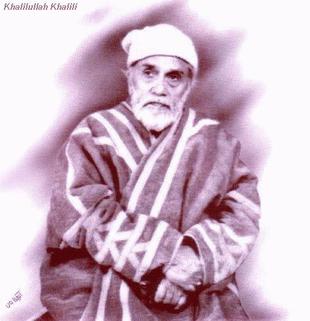
Khalilullah Khalili was Afghanistan's foremost 20th century poet as well as a noted historian, university professor, diplomat and royal confidant. He was the last of the great classical Persian poets and among the first to introduce modern Persian poetry and Nimai style to Afghanistan. He had also expertise in Khorasani style and was a follower of Farrukhi Sistani. Almost alone among Afghanistan's poets, he enjoyed a following in Iran where his selected poems have been published. His works have been praised by renowned Iranian literary figures and intellectuals. Many see him as the greatest contemporary poet of the Persian language in Afghanistan. He is also known for his major work "Hero of Khorasan", a controversial biography of Habībullāh Kalakānī, Emir of Afghanistan in 1929.

Brigadier General Rahmatullah Safi is an Afghan former army officer, former commander of the 444th Commando Battalion under the Kingdom of Afghanistan and mujahideen commander who fought during the Soviet–Afghan War. He was later claimed to have been the representative of the Taliban movement in Europe.
Sartōr Faqīr, also known as "Mullah Mastan or Mullah Mastana" Pipi Faqir or Saidullah in Pashto and by the British as "The Great Fakir" or "Mad Faqir", "Mad Faqir of Swat" or the "Mad Mullah", was a Pashtun tribal Yusufzai leader and freedom fighter. His name Mullah Mastan translates to "God-intoxicated" as a reference to his religious convictions and his belief that he was capable of miraculous powers and challenging the British Empire.
The following lists events that happened during 2004 in Afghanistan.

Farrokh Khan, also known as Amin ol-Dowleh (امینالدوله), was a high-ranking Iranian official from the Ghaffari family. Between 1855–1857, he served as the Iranian ambassador to the French court in Paris, where he assisted in signing the Treaty of Paris, thus ending the losing Anglo-Persian War and withdrawing the Iranian army from Herat.
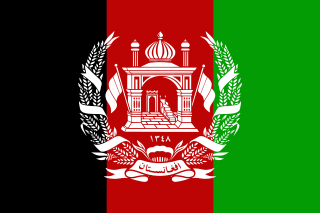
The Kingdom of Afghanistan was a monarchy in Central Asia that was established in 1926 as a successor state to the Emirate of Afghanistan. It was proclaimed by its first king, Amanullah Khan, seven years after he acceded to the throne. The monarchy ended in the 1973 Afghan coup d'état.
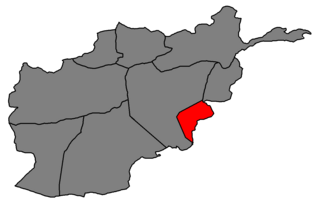
The Khost rebellion, also known as the 1924 Mangal uprising, the Khost revolt or the Mangal Revolt was an uprising against the Westernization and modernizing reforms of Afghanistan’s king, Amanullah Khan. The uprising was launched in Southern Province, Afghanistan, and lasted from March 1924 to January 1925. It was fought by the Mangal Pashtun tribe, later joined by the Sulaiman Khel, Ali Khel, Jaji, Jadran and Ahmadzai tribes. After causing the death of over 14,000 Afghans, the revolt was finally quelled in January 1925.
2003 in Afghanistan. A list of notable incidents in Afghanistan during 2003

The 1973 Afghan coup d'état, also called by Afghans as the Coup of 26 Saratan and self-proclaimed as the Revolution of 26 Saratan 1352, was led by Army General and prince Mohammad Daoud Khan against his cousin, King Mohammad Zahir Shah, on 17 July 1973, which resulted in the establishment of the Republic of Afghanistan under a one-party system led by Daoud Khan.

The Afghan tribal revolts of 1944–1947 or the Khost disturbances were a series of tribal revolts in the Kingdom of Afghanistan by Zadran, Safi and Mangal tribesmen which lasted from February 1944 to January 1947. The causes of the revolts lay in the worsening conditions of farmers, changes in conscription laws, the elimination of the power of Safi tribal leaders, Amanullah loyalism, trading monopolies, government surveillance, taxation, and poverty. The conflict began when government forces clashed with the forces of a tribal leader named Mazrak, who led the Zadran tribe in revolt. The Zadran uprising was followed by additional uprisings by the Safi and Mangal, the former of which elected their own king, Salemai. Faqir Ipi, a tribal leader from Waziristan, also fought for the restoration of former king Amanullah Khan alongside other rebels.
Shahswar was an Afghan politician who served as minister in under Salemai, who ruled only in the Eastern Province. Alternative renderings of his name include Shah Sarwar and Shasawar.
Salemai or Salimai was an Afghan rebel king who ruled only in the Eastern Province.
Amanul Mulk was an Afghan politician who served as the Minister of Defence under Salemai, who ruled only in the Eastern Province.
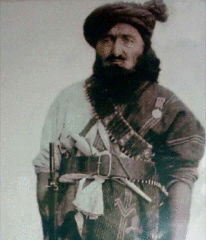
Babrak Khan was a Zadran chieftain who was the father of Said Akbar Babrak and of Mazrak Zadran.
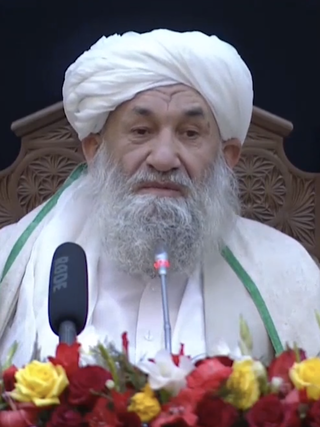
Mohammad Hasan Akhund is an Afghan mullah, politician and Taliban leader who is currently the acting prime minister of Afghanistan in the internationally unrecognized Taliban regime since 7 September 2021.
References
- ↑ Olesen, Asta (1995). Islam and Politics in Afghanistan. Psychology Press. pp. 196, 198. ISBN 978-0-7007-0299-2.
- ↑ Mason, Whit (2011-04-14). The Rule of Law in Afghanistan: Missing in Inaction. Cambridge University Press. pp. 85, 86. ISBN 978-1-139-49552-3.
- ↑ Edwards, David B. (2002-04-02). Before Taliban: Genealogies of the Afghan Jihad. University of California Press. pp. 163, 164. ISBN 978-0-520-22861-0.
- 1 2 3 Mason, Whit (2011-04-14). The Rule of Law in Afghanistan: Missing in Inaction. Cambridge University Press. pp. 85, 86. ISBN 978-1-139-49552-3.
- ↑ Edwards, David B. (2017-05-09). Caravan of Martyrs: Sacrifice and Suicide Bombing in Afghanistan. Univ of California Press. p. 33. ISBN 978-0-520-29479-0.